- Sen. Ted Cruz: Americans who join ISIS should be stripped of citizenship
- He says ISIS threat is a reason to increase border security
- Cruz: Obama should seek congressional authorization for campaign vs. ISIS
- The idea of partnering with Iran or Syria against ISIS would be a mistake, he says
Editor's note: Sen. Ted Cruz is a Republican representing Texas. The opinions expressed in this commentary are his.
(CNN) -- This week, as we mark the 13th anniversary of horrific attacks on our home soil, Americans should have no illusions about the terrorists who have repeatedly declared their intent to strike America again.
We know the threat of the vicious terrorist organization known as ISIS has concerned the intelligence community for more than a year. And the group's atrocities have been well-documented since it began attacking northern Iraq, and it is deeply concerning that it has taken President Barack Obama so long to develop any kind of strategy to address these increasingly powerful terrorists who have now gruesomely killed two American journalists before the world stage.
On Wednesday evening, the President will finally share with the American people his "game plan," as he calls it, to combat ISIS. It is my hope that he will propose a clear plan, consistent with the Constitution, to keep Americans safe, and that it is not laden with impractical contingencies, such as resolving the Syrian civil war, reaching political reconciliation in Iraq or achieving "consensus" in the international community.
Analysis: Obama speech a do-over on 'no strategy' comment
 ISIS: How did they get here so quickly?
ISIS: How did they get here so quickly? There are three specific steps that should be taken.
First and foremost, Washington should resolve to make border security a top priority finally, rather than an afterthought, of this plan in light of concerns about potential ISIS activities on our southern border, cited in a Texas Department of Public Safety bulletin reported by Fox News. As long as our border isn't secure, the government is making it far too easy for terrorists to infiltrate our nation.
Second, Congress should make fighting for or supporting ISIS an affirmative renunciation of American citizenship. Numerous Americans have joined ISIS along with hundreds of others from the European Union.
We know that some of them are trying to return to their countries of origin to carry out terrorist attacks. How do we know that? It's already been attempted. On May 24, a suspected French jihadist with possible ISIS ties traveled to Belgium, where he is accused of attacking innocent visitors at the Jewish Museum of Belgium in Brussels and slaughtering four people -- and it was reported earlier this week that he allegedly had been plotting a larger attack on Paris on Bastille Day. In August, an accused ISIS sympathizer, Donald Ray Morgan, was arrested at John F. Kennedy International Airport in New York trying to re-enter the United States.

 U.S. Secretary of State John Kerry, left, shakes hands with new Iraqi Prime Minister Haider al-Abadi after a meeting in Baghdad, Iraq, on Wednesday, September 10. Kerry is traveling to the Mideast this week to discuss ways to bolster the stability of the new Iraqi government and combat the ISIS militant group that has taken over large swaths of Iraq and Syria.
U.S. Secretary of State John Kerry, left, shakes hands with new Iraqi Prime Minister Haider al-Abadi after a meeting in Baghdad, Iraq, on Wednesday, September 10. Kerry is traveling to the Mideast this week to discuss ways to bolster the stability of the new Iraqi government and combat the ISIS militant group that has taken over large swaths of Iraq and Syria. 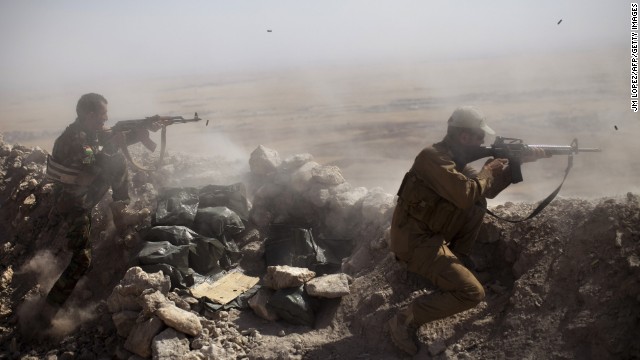 Kurdish Peshmerga fighters fire at ISIS militant positions from their position on the top of Mount Zardak, east of Mosul, Iraq, on Tuesday, September 9.
Kurdish Peshmerga fighters fire at ISIS militant positions from their position on the top of Mount Zardak, east of Mosul, Iraq, on Tuesday, September 9. 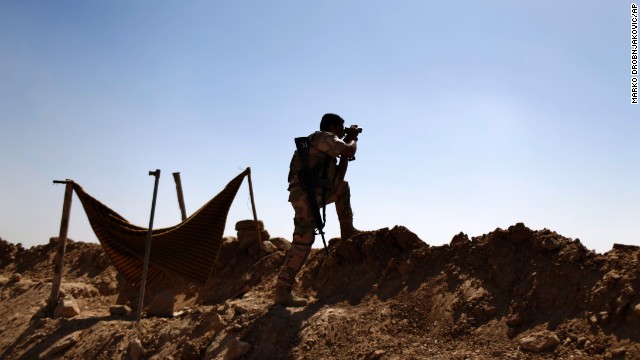 A Kurdish fighter eyes ISIS positions outside Makhmour, Iraq, on Saturday, September 6.
A Kurdish fighter eyes ISIS positions outside Makhmour, Iraq, on Saturday, September 6.  Iraqis on Friday, September 5, exhume bodies from a mass grave found after Kurdish forces and Shiite militiamen retook the Iraqi town of Sulaiman Bek.
Iraqis on Friday, September 5, exhume bodies from a mass grave found after Kurdish forces and Shiite militiamen retook the Iraqi town of Sulaiman Bek. 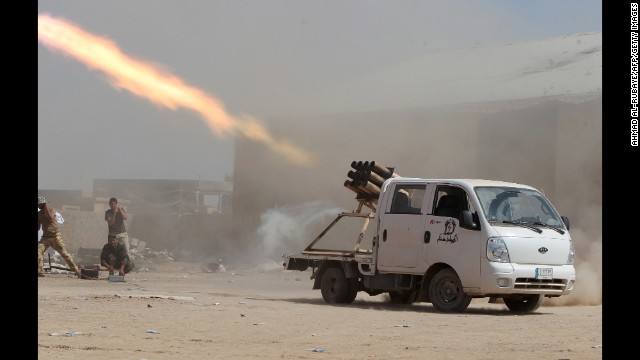 Iraqi Shiite militia fighters fire a rocket toward ISIS positions outside Tikrit, Iraq, on Wednesday, September 3.
Iraqi Shiite militia fighters fire a rocket toward ISIS positions outside Tikrit, Iraq, on Wednesday, September 3.  An Iraqi fighter jet flies over Amerli, Iraq, on September 3. Iraqi forces recently broke the siege of Amerli from ISIS fighters.
An Iraqi fighter jet flies over Amerli, Iraq, on September 3. Iraqi forces recently broke the siege of Amerli from ISIS fighters. 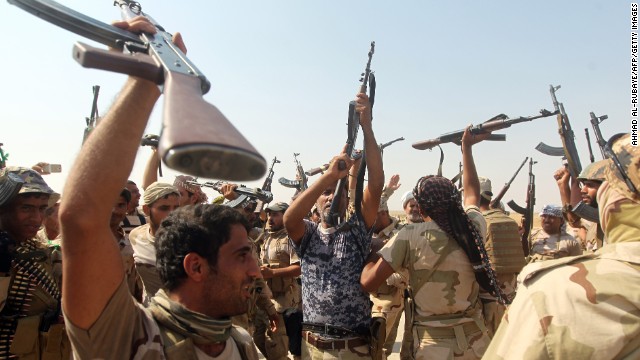 Iraqi volunteer fighters on Monday, September 1, celebrate breaking the Amerli siege. ISIS militants had surrounded Amerli, 70 miles north of Baquba, Iraq, since mid-June.
Iraqi volunteer fighters on Monday, September 1, celebrate breaking the Amerli siege. ISIS militants had surrounded Amerli, 70 miles north of Baquba, Iraq, since mid-June.  Iraqi Shiite Turkmen, mostly women and children, try to board an Iraqi Army helicopter bringing supplies to Amerli on Saturday, August 30.
Iraqi Shiite Turkmen, mostly women and children, try to board an Iraqi Army helicopter bringing supplies to Amerli on Saturday, August 30. 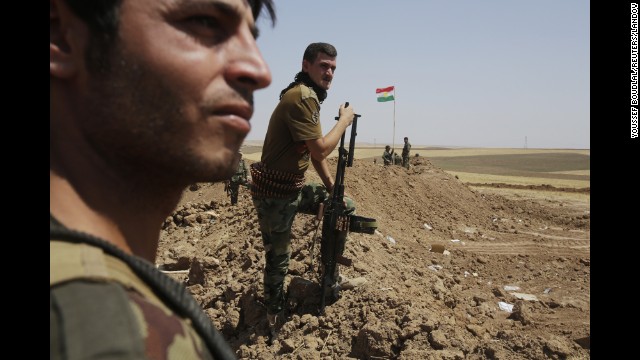 Kurdish Peshmerga forces stand guard at their position in the Omar Khaled village west of Mosul on Sunday, August 24.
Kurdish Peshmerga forces stand guard at their position in the Omar Khaled village west of Mosul on Sunday, August 24. 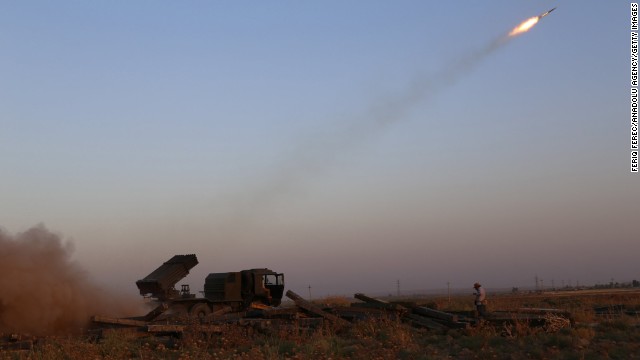 Kurdish Peshmergas fight to regain control of the town of Celavle, in Iraq's Diyala province, on August 24.
Kurdish Peshmergas fight to regain control of the town of Celavle, in Iraq's Diyala province, on August 24. 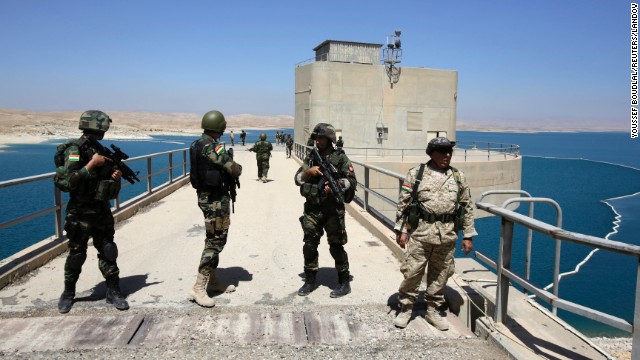 Peshmerga fighters stand guard at Mosul Dam in northern Iraq on Thursday, August 21. With the help of U.S. military airstrikes, Kurdish and Iraqi forces retook the dam from ISIS militants on August 18. A breach of the dam would have been catastrophic for millions of Iraqis who live downstream from it.
Peshmerga fighters stand guard at Mosul Dam in northern Iraq on Thursday, August 21. With the help of U.S. military airstrikes, Kurdish and Iraqi forces retook the dam from ISIS militants on August 18. A breach of the dam would have been catastrophic for millions of Iraqis who live downstream from it.  Displaced Iraqis receive clothes from a charity at a refugee camp near Feeshkhabour, Iraq, on Tuesday, August 19.
Displaced Iraqis receive clothes from a charity at a refugee camp near Feeshkhabour, Iraq, on Tuesday, August 19.  A woman holds her sister during a sandstorm at a refugee camp in Feeshkhabour on August 19.
A woman holds her sister during a sandstorm at a refugee camp in Feeshkhabour on August 19. 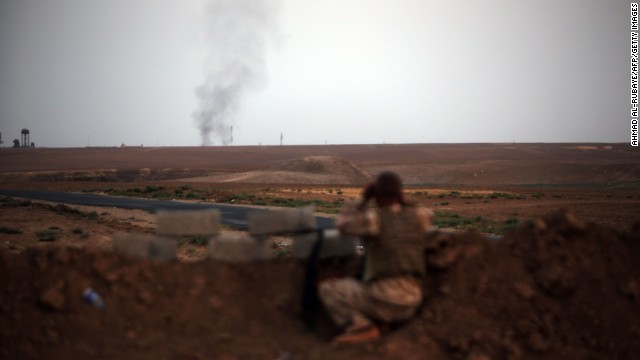 A fighter with Kurdish Peshmerga forces battles ISIS militants near Mosul on Monday, August 18.
A fighter with Kurdish Peshmerga forces battles ISIS militants near Mosul on Monday, August 18.  A Shiite fighter defends a post while backing the Iraqi army in its fight against ISIS militants south of Baghdad on August 18.
A Shiite fighter defends a post while backing the Iraqi army in its fight against ISIS militants south of Baghdad on August 18.  A Kurdish Peshmerga fighter patrols near the Mosul Dam in Chamibarakat, Iraq, on Sunday, August 17.
A Kurdish Peshmerga fighter patrols near the Mosul Dam in Chamibarakat, Iraq, on Sunday, August 17.  Smoke rises after a U.S. airstrike near the Mosul Dam on August 17.
Smoke rises after a U.S. airstrike near the Mosul Dam on August 17.  A Kurdish Peshmerga fighter prepares his weapon August 17 at a combat position near the Mosul Dam.
A Kurdish Peshmerga fighter prepares his weapon August 17 at a combat position near the Mosul Dam.  Trucks carrying Kurdish Peshmerga fighters head to the Mosul Dam on August 17.
Trucks carrying Kurdish Peshmerga fighters head to the Mosul Dam on August 17.  From a position manned by the Kurdish Peshmerga south of Kirkuk, Iraq, Kirkuk Gov. Najm al-Din Omar looks through binoculars toward Islamist jihadist positions on August 17.
From a position manned by the Kurdish Peshmerga south of Kirkuk, Iraq, Kirkuk Gov. Najm al-Din Omar looks through binoculars toward Islamist jihadist positions on August 17. 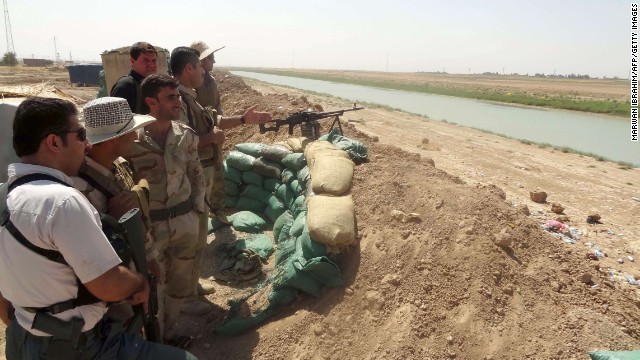 Kurdish Peshmerga fighters stand behind a sand barricade set up close to the village of Bashir, Iraq, on August 17.
Kurdish Peshmerga fighters stand behind a sand barricade set up close to the village of Bashir, Iraq, on August 17. 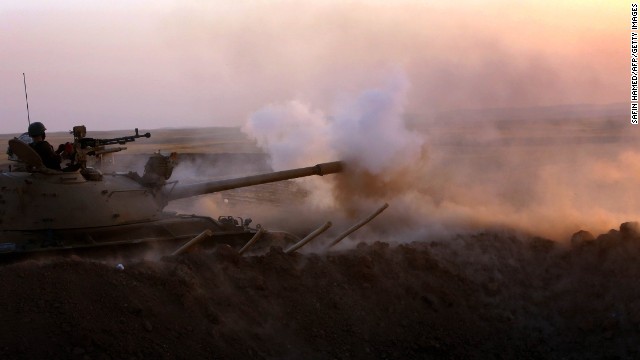 Kurdish Peshmerga fighters fire at ISIS in Khazair, Iraq, on Thursday, August 14.
Kurdish Peshmerga fighters fire at ISIS in Khazair, Iraq, on Thursday, August 14. 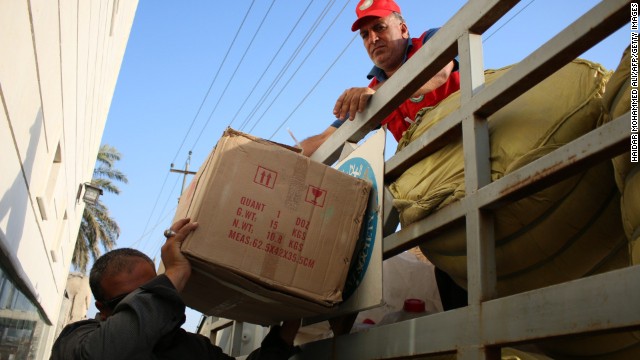 Volunteers of the Iraqi Red Crescent Society unload boxes of goods before distributing them August 14 to families who fled from ISIS.
Volunteers of the Iraqi Red Crescent Society unload boxes of goods before distributing them August 14 to families who fled from ISIS.  Displaced Iraqis of the Yazidi faith reach for bottled water at the Bajid Kandala refugee camp in Iraq's Dohuk province on Wednesday, August 13.
Displaced Iraqis of the Yazidi faith reach for bottled water at the Bajid Kandala refugee camp in Iraq's Dohuk province on Wednesday, August 13.  A Yazidi woman and children take shelter inside a tent at the Bajid Kandala camp on August 13.
A Yazidi woman and children take shelter inside a tent at the Bajid Kandala camp on August 13. 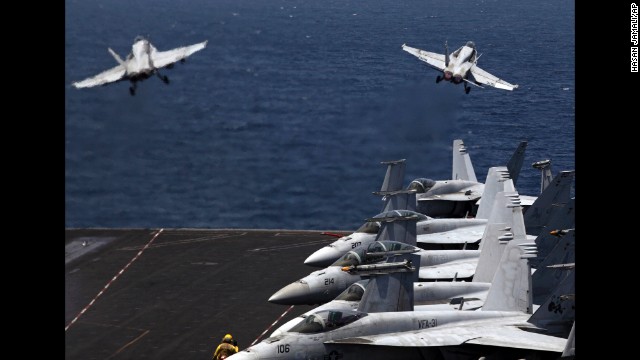 From the flight deck of the USS George H.W. Bush, which is in the Persian Gulf, two U.S. fighter jets take off for a mission in Iraq on Monday, August 11. U.S. President Barack Obama has authorized airstrikes against Islamic militants and food drops for Iraqis who are trapped by the militants.
From the flight deck of the USS George H.W. Bush, which is in the Persian Gulf, two U.S. fighter jets take off for a mission in Iraq on Monday, August 11. U.S. President Barack Obama has authorized airstrikes against Islamic militants and food drops for Iraqis who are trapped by the militants.  Displaced Iraqis of the Yazidi faith cross the Syria-Iraq border on Sunday, August 10.
Displaced Iraqis of the Yazidi faith cross the Syria-Iraq border on Sunday, August 10. 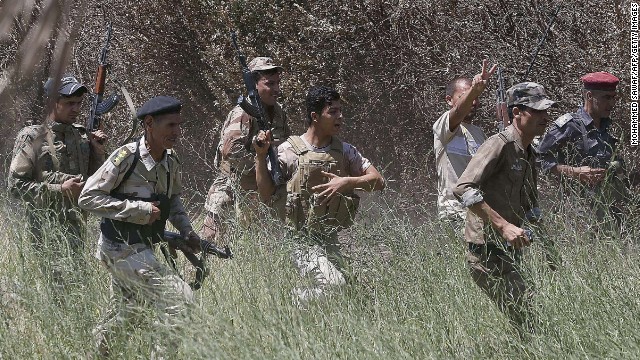 Iraqi soldiers fan out into a field in Jurf al Sakhr, Iraq, on August 10 after they reportedly pushed back Islamic jihadist fighters from the area.
Iraqi soldiers fan out into a field in Jurf al Sakhr, Iraq, on August 10 after they reportedly pushed back Islamic jihadist fighters from the area.  An Iraqi man inspects the debris of houses in Falluja, Iraq, after an apparent air raid by the Iraqi Air Force on August 10.
An Iraqi man inspects the debris of houses in Falluja, Iraq, after an apparent air raid by the Iraqi Air Force on August 10. 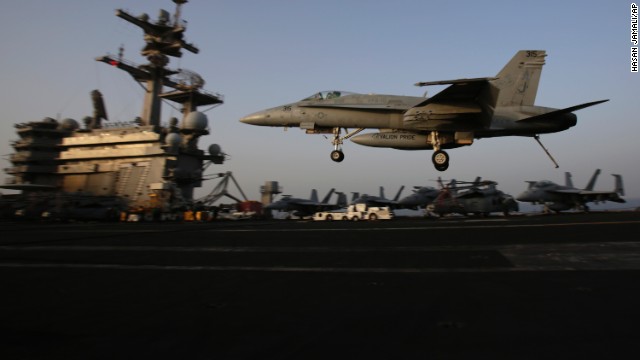 An F/A-18C Hornet lands on the flight deck of the USS George H.W. Bush on August 10.
An F/A-18C Hornet lands on the flight deck of the USS George H.W. Bush on August 10.  An Iraqi Yazidi child, whose family fled their home a week ago when ISIS militants attacked their town, looks on at a makeshift shelter August 10 in Dohuk, which is in Iraq's autonomous Kurdistan region.
An Iraqi Yazidi child, whose family fled their home a week ago when ISIS militants attacked their town, looks on at a makeshift shelter August 10 in Dohuk, which is in Iraq's autonomous Kurdistan region.  Displaced Iraqis from the Yazidi community settle outside the Bajid Kandala camp on Saturday, August 9.
Displaced Iraqis from the Yazidi community settle outside the Bajid Kandala camp on Saturday, August 9.  Displaced Iraqis ride on a truck on a mountain road near the Turkish-Iraq border, outside Dahuk, on August 9.
Displaced Iraqis ride on a truck on a mountain road near the Turkish-Iraq border, outside Dahuk, on August 9.  Thousands of Yazidis are escorted to safety by Kurdish Peshmerga forces and a People's Protection Unit in Mosul on August 9.
Thousands of Yazidis are escorted to safety by Kurdish Peshmerga forces and a People's Protection Unit in Mosul on August 9.  Humanitarian aid for Iraq is loaded onto an aircraft in Norton, England, on Friday, August 8.
Humanitarian aid for Iraq is loaded onto an aircraft in Norton, England, on Friday, August 8. 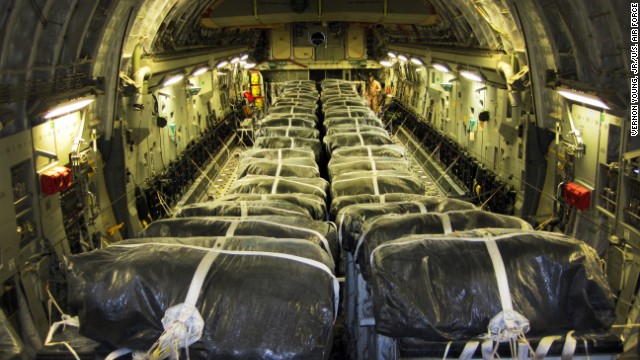 Pallets of bottled water are loaded aboard a U.S. Air Force aircraft in preparation for a humanitarian airdrop over Iraq on August 8.
Pallets of bottled water are loaded aboard a U.S. Air Force aircraft in preparation for a humanitarian airdrop over Iraq on August 8.  Smoke rises after airstrikes targeted ISIS militants outside the Iraqi city of Irbil on Friday, August 8.
Smoke rises after airstrikes targeted ISIS militants outside the Iraqi city of Irbil on Friday, August 8. 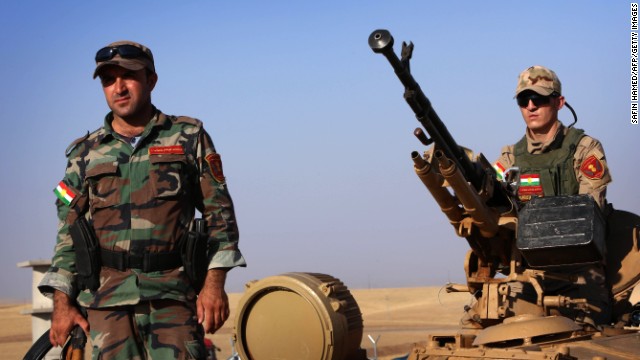 Kurdish Peshmerga fighters take position on the front line on August 8.
Kurdish Peshmerga fighters take position on the front line on August 8.  Displaced Iraqi Christians settle at St. Joseph Church in Irbil on Thursday, August 7.
Displaced Iraqi Christians settle at St. Joseph Church in Irbil on Thursday, August 7. 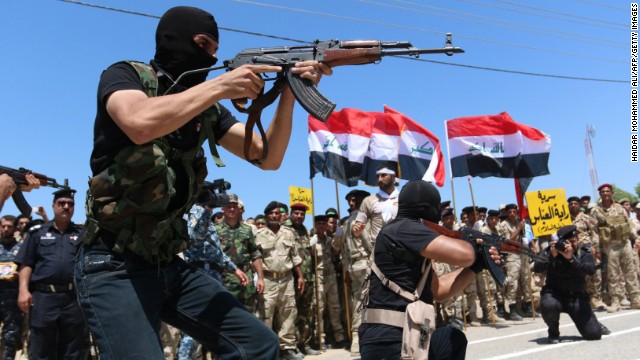 Iraqi Shiite volunteers who have joined government forces to fight ISIS take part in a training session near Basra, Iraq, on August 7.
Iraqi Shiite volunteers who have joined government forces to fight ISIS take part in a training session near Basra, Iraq, on August 7. 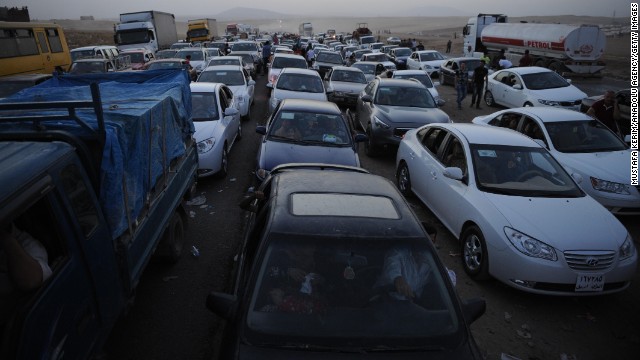 Thousands of Yazidi and Christian people flee Mosul on Wednesday, August 6, after the latest wave of ISIS advances.
Thousands of Yazidi and Christian people flee Mosul on Wednesday, August 6, after the latest wave of ISIS advances.  Kurdish Peshmerga forces and members of the Syrian People's Protection Units engage ISIS members in the Mahmudiye village of Mosul on Tuesday, August 5.
Kurdish Peshmerga forces and members of the Syrian People's Protection Units engage ISIS members in the Mahmudiye village of Mosul on Tuesday, August 5.  Yazidi women who fled violence in Sinjar, Iraq, take shelter at a school in Dohuk on August 5.
Yazidi women who fled violence in Sinjar, Iraq, take shelter at a school in Dohuk on August 5.  People in Mosul walk on the rubble of the destroyed Mosque of The Prophet Yunus, which is Arabic for Jonah, on Thursday, July 24.
People in Mosul walk on the rubble of the destroyed Mosque of The Prophet Yunus, which is Arabic for Jonah, on Thursday, July 24.  An Iraqi child walks through a displacement camp Saturday, June 28, in Khazair, Iraq.
An Iraqi child walks through a displacement camp Saturday, June 28, in Khazair, Iraq.  An Iraqi woman walks with her child outside of a displacement camp June 28 in Khazair.
An Iraqi woman walks with her child outside of a displacement camp June 28 in Khazair.  Peshmerga fighters check cars at the entrance of a temporary displacement camp in Khazair on Thursday, June 26.
Peshmerga fighters check cars at the entrance of a temporary displacement camp in Khazair on Thursday, June 26.  A group of women wait outside the temporary displacement camp in Khazair on June 26.
A group of women wait outside the temporary displacement camp in Khazair on June 26.  Smoke rises in the Karakus district of Mosul as clashes between Iraqi forces and ISIS militants take place on June 26.
Smoke rises in the Karakus district of Mosul as clashes between Iraqi forces and ISIS militants take place on June 26.  Food is handed out at the displacement camp in Khazair.
Food is handed out at the displacement camp in Khazair.  A child walks over discarded water bottles and trash at a registration area in the displacement camp in Khazair on June 26.
A child walks over discarded water bottles and trash at a registration area in the displacement camp in Khazair on June 26. 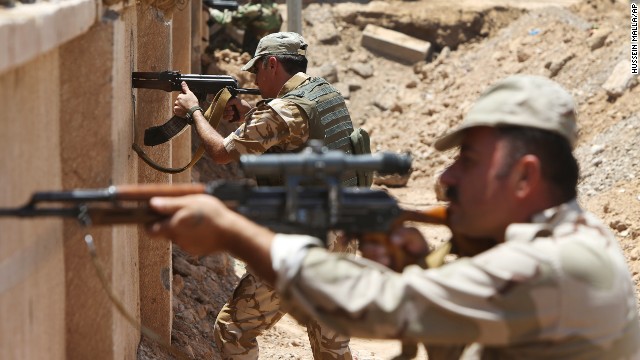 Kurdish Peshmerga take their positions behind a wall on the front line of the conflict with ISIS militants in Tuz Khormato, Iraq, on Wednesday, June 25.
Kurdish Peshmerga take their positions behind a wall on the front line of the conflict with ISIS militants in Tuz Khormato, Iraq, on Wednesday, June 25.  Peshmerga fighters clean their weapons at a base in Tuz Khormato on June 25.
Peshmerga fighters clean their weapons at a base in Tuz Khormato on June 25.  Female Peshmerga between 18 and 45 years old form a special unit that is called to serve in any conditions. A soldier is pictured here on June 25.
Female Peshmerga between 18 and 45 years old form a special unit that is called to serve in any conditions. A soldier is pictured here on June 25.  A woman gathers bread in a temporary displacement camp for Iraqis on Tuesday, June 24.
A woman gathers bread in a temporary displacement camp for Iraqis on Tuesday, June 24.  An ISIS fighter takes control of a traffic intersection in Mosul on Sunday, June 22.
An ISIS fighter takes control of a traffic intersection in Mosul on Sunday, June 22.  An ISIS member distributes a copy of the Quran, Islam's holy book, to a driver in Mosul on June 22.
An ISIS member distributes a copy of the Quran, Islam's holy book, to a driver in Mosul on June 22.  Members of ISIS patrol in Falluja on Saturday, June 21.
Members of ISIS patrol in Falluja on Saturday, June 21.  "Peace Brigade" volunteers raise their weapons and chant slogans during a parade in the Shiite stronghold of Sadr City on Saturday, June 21, in Baghdad. The armed group was formed to protect Shiite holy shrines against possible attacks by Sunni militants.
"Peace Brigade" volunteers raise their weapons and chant slogans during a parade in the Shiite stronghold of Sadr City on Saturday, June 21, in Baghdad. The armed group was formed to protect Shiite holy shrines against possible attacks by Sunni militants.  Iraqi men register to fight alongside security forces Friday, June 20, at a recruitment center in Baghdad.
Iraqi men register to fight alongside security forces Friday, June 20, at a recruitment center in Baghdad. 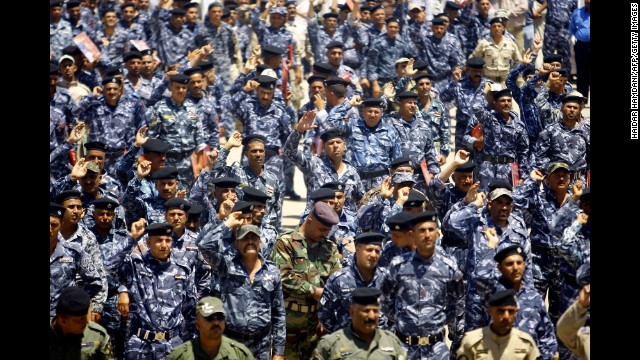 New army recruits gather in Najaf, Iraq, on Wednesday, June 18, following a call for Iraqis to take up arms against Islamic militant fighters.
New army recruits gather in Najaf, Iraq, on Wednesday, June 18, following a call for Iraqis to take up arms against Islamic militant fighters.  Soldiers with an Iraqi anti-terrorism unit are on guard June 18 in Baghdad.
Soldiers with an Iraqi anti-terrorism unit are on guard June 18 in Baghdad.  A Kurdish Peshmerga fighter injured in clashes with ISIS lies in a hospital in Irbil on June 18.
A Kurdish Peshmerga fighter injured in clashes with ISIS lies in a hospital in Irbil on June 18. 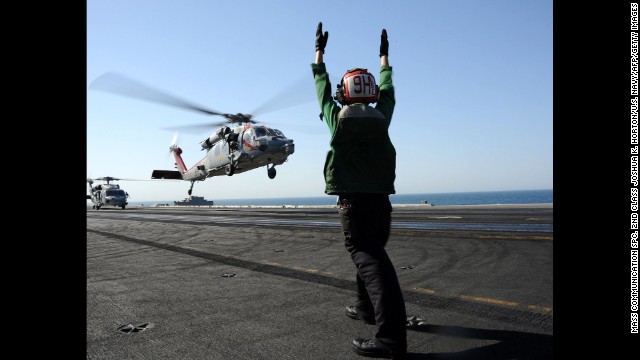 An MH-60R Sea Hawk helicopter lands on the aircraft carrier USS George H.W. Bush in the Persian Gulf on Tuesday, June 17.
An MH-60R Sea Hawk helicopter lands on the aircraft carrier USS George H.W. Bush in the Persian Gulf on Tuesday, June 17. 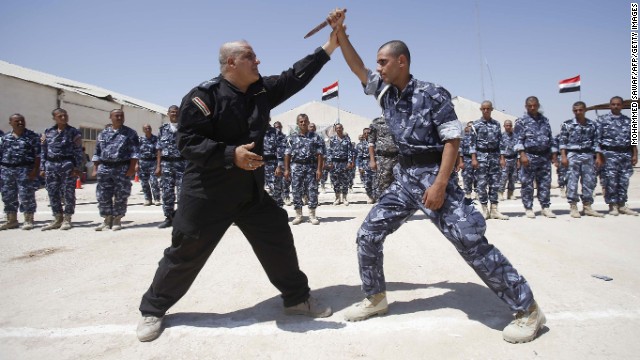 Newly recruited Iraqi volunteer fighters take part in a training session in Karbala, Iraq, on June 17.
Newly recruited Iraqi volunteer fighters take part in a training session in Karbala, Iraq, on June 17.  Iraqi tribesmen gather in Baghdad on Monday, June 16, to show their readiness to join Iraqi security forces in the fight against Islamic militants.
Iraqi tribesmen gather in Baghdad on Monday, June 16, to show their readiness to join Iraqi security forces in the fight against Islamic militants.  Iraqi Christian children gather inside the Church of the Virgin Mary for prayers in Bartala, Iraq, a town near Mosul, on Sunday, June 15.
Iraqi Christian children gather inside the Church of the Virgin Mary for prayers in Bartala, Iraq, a town near Mosul, on Sunday, June 15.  Shiite tribal fighters raise their weapons and chant slogans against ISIS in Basra on June 15.
Shiite tribal fighters raise their weapons and chant slogans against ISIS in Basra on June 15. 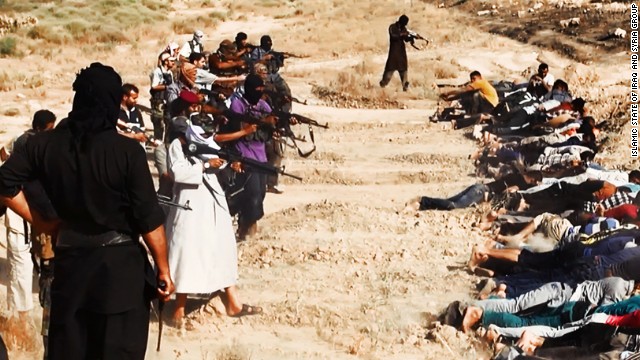 Members of ISIS prepare to execute some soldiers from Iraq's security forces in this image, one of many reportedly posted by the militant group online. CNN cannot independently confirm the authenticity of the images.
Members of ISIS prepare to execute some soldiers from Iraq's security forces in this image, one of many reportedly posted by the militant group online. CNN cannot independently confirm the authenticity of the images.  A woman cradles her baby Thursday, June 12, at a temporary camp set up in Aski Kalak, Iraq, to shelter those fleeing the violence in northern Nineveh province.
A woman cradles her baby Thursday, June 12, at a temporary camp set up in Aski Kalak, Iraq, to shelter those fleeing the violence in northern Nineveh province.  A girl fleeing from Mosul arrives at a Kurdish checkpoint on June 12.
A girl fleeing from Mosul arrives at a Kurdish checkpoint on June 12. 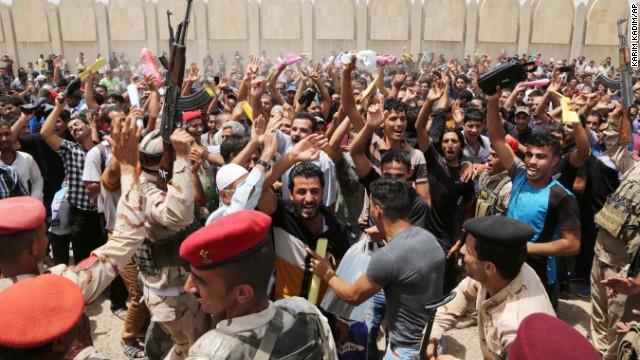 Iraqi men chant slogans outside of an army recruiting center to volunteer for military service June 12 in Baghdad.
Iraqi men chant slogans outside of an army recruiting center to volunteer for military service June 12 in Baghdad. 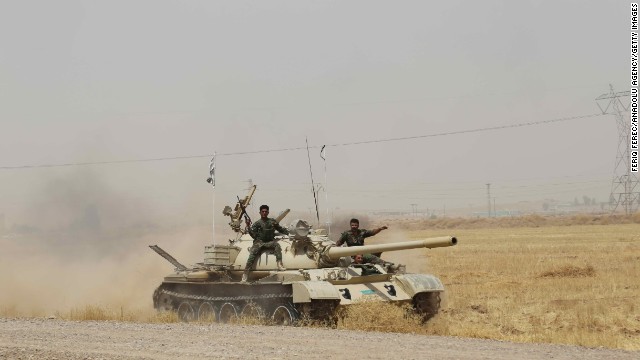 Kurdish Peshmerga forces, along with Iraqi special forces, deploy their troops and armored vehicles outside of Kirkuk on June 12.
Kurdish Peshmerga forces, along with Iraqi special forces, deploy their troops and armored vehicles outside of Kirkuk on June 12. 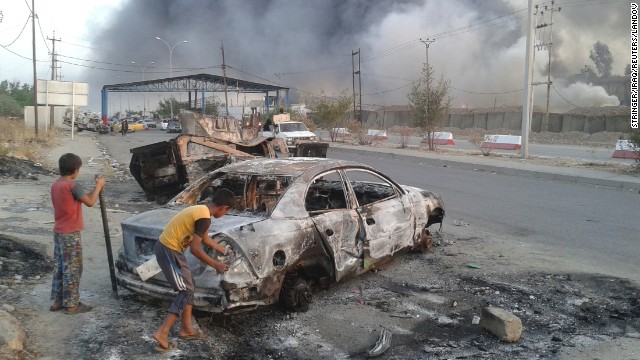 Children stand next to a burnt vehicle during clashes between Iraqi security forces and ISIS militants in Mosul on Tuesday, June 10.
Children stand next to a burnt vehicle during clashes between Iraqi security forces and ISIS militants in Mosul on Tuesday, June 10. 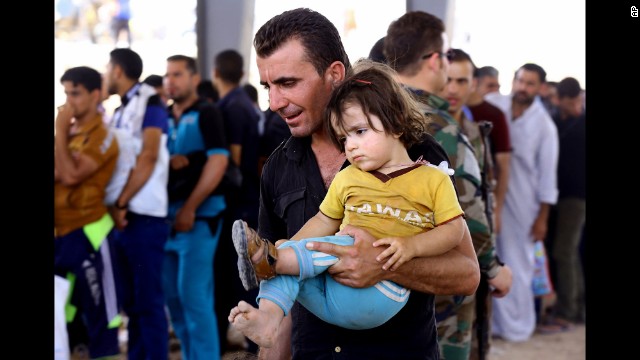 Civilians from Mosul escape to a refugee camp near Irbil on June 10.
Civilians from Mosul escape to a refugee camp near Irbil on June 10.  Iraqis fleeing the violence wait in their vehicles at a Kurdish checkpoint in Aski Kalak on June 10.
Iraqis fleeing the violence wait in their vehicles at a Kurdish checkpoint in Aski Kalak on June 10.  Photos: Iraq under siege
Photos: Iraq under siege  Pres. backtracks on ISIS 'JV' team comment
Pres. backtracks on ISIS 'JV' team comment  Obama to layout ISIS game plan tonight
Obama to layout ISIS game plan tonight On Monday I filed the Expatriate Terrorist Act of 2014, which would amend the existing statute governing renunciation of U.S. citizenship to include fighting for a hostile foreign government or foreign terrorist organization as an affirmative renunciation of citizenship. By fighting for ISIS, U.S. citizens have expressed their desire to become citizens of the terrorist group, which calls itself the Islamic State. We should not permit them to return to America, with a U.S. passport, to carry out acts of terror at home.
It is my hope that this legislation will attract bipartisan support, and will bring Washington together with one united voice in support of keeping Americans safe from ISIS acts of terror.
Third, we should do everything possible to make ISIS understand there are serious ramifications for threatening to attack the United States and for killing American civilians. While damaging ISIS' financial assets is certainly a part of this action, because of the very nature of ISIS, the response must be principally military.
We should concentrate on a coordinated and overwhelming air campaign to destroy the capability of ISIS to carry out terrorist attacks on the United States.
Gingrich: 10 questions for Obama on ISIS
The President's previously stated goal -- to "shrink" ISIS' "sphere of influence" until it is a "manageable problem" -- is not encouraging. The objective should not be to make ISIS "manageable"; the objective should be to protect the United States and to destroy the terrorists who have declared jihad on our nation.
The White House's suggested ways of countering ISIS have, so far, been naive and ineffective.
Now, faced with the growing threat of the group, Americans are being told Syria and Iran may suddenly be our friends, and ISIS is now our enemy. This is nonsense.
The enemy of our enemy is not always our friend.
Other possible objectives the White House is considering are equally worrisome. We must reject the notion that any U.S. action be contingent on political reconciliation between Sunnis and Shiites in Baghdad. The Sunnis and Shiites have been engaged in a sectarian civil war since 632. While we all wish the Iraqis success in their most recent attempt to form a government, it is the height of hubris and ignorance to make American national security contingent on the resolution of a 1,500-year-old religious conflict.
Likewise, any action we take to stop ISIS should not be contingent on any consensus from the so-called international community.
Obama to Congress: No vote needed on ISIS strategy
America is blessed to have good friends and allies who understand the threat of ISIS, and we welcome their support. Indeed, this is an opportunity to reverse the destructive policy of the last five years of reaching out and appeasing our enemies while giving our allies the cold shoulder. Instead, we should partner closely with our friends in the region who are already engaged in this fight, notably Israel, Jordan and the Kurds.
This mission must be led by the United States if it is to be done right, and we cannot make the assembling of a coalition a higher priority than the execution of our mission.
National security hawks call for airstrikes targeting ISIS leaders
And, leading that mission requires a clear articulation of the mission. Finally, the President appears to have ruled out making any formal authorization request from Congress to take military action. This is wrong.
I ask the President to reconsider.
Only Congress has the authority to declare war. While our commander in chief has constitutional authority to respond to an imminent danger, Obama has not suggested that is the case. He is reportedly planning a mission that could last as long as three years and may require a range of actions.
Therefore, congressional authorization is required by the Constitution.
Making this formal request would provide the President with an opportunity to present the American people with a clearly defined military objective, tethered to national security, to protect our nation and to unite everyone in the mission to eradicate ISIS.
Read CNNOpinion's new Flipboard magazine.
Follow us on Twitter @CNNOpinion.
Join us on http://ift.tt/1bl3g0P.